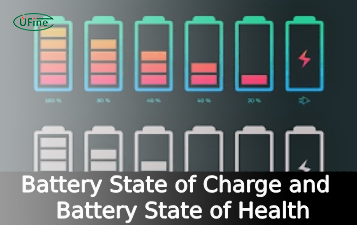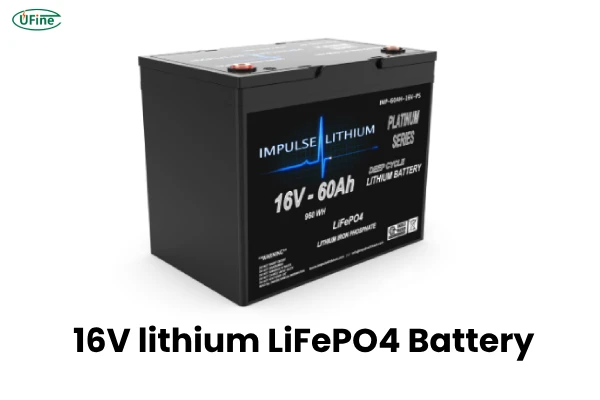
- Part 1. Types of 16V batteries
- Part 2. Why choose a 16V lithium battery?
- Part 3. Technical specifications & ratings
- Part 4. Applications of 16V batteries
- Part 5. Performance comparison: 16V lithium vs. other battery types
- Part 6. Charging a 16V lithium battery
- Part 7. Lifespan & maintenance tips
- Part 8. Cost & value analysis
- Part 9. Popular brands & models
- Part 10. FAQ
Part 1. Types of 16V batteries
When it comes to 16V batteries, there are several types available in the market, each with distinct characteristics suited for different applications. The most common include:
16V Lead-Acid Batteries
These are traditional batteries widely used in automotive and industrial applications. Lead-acid batteries are known for their reliability and low upfront cost. However, they are relatively heavy, have limited cycle life, and require regular maintenance such as topping off electrolyte levels.
16V Lithium-Ion Batteries
Lithium-ion (Li-ion) batteries are the modern alternative to lead-acid. They offer higher energy density, meaning they store more energy in a lighter, smaller package. Li-ion batteries are maintenance-free and provide longer lifespan and better performance under high discharge rates.
16V Lithium Iron Phosphate (LiFePO₄) Batteries
A subtype of lithium batteries, LiFePO₄ cells are gaining popularity due to their improved thermal stability and safety compared to standard lithium-ion chemistries. These batteries offer longer cycle life and enhanced safety features, making them ideal for high-demand or off-grid power systems.
Pros and Cons Overview
| Battery Type | Pros | Cons |
|---|---|---|
| Lead-Acid | Low cost, widely available | Heavy, short cycle life, maintenance required |
| Lithium-Ion (Li-ion) | Lightweight, high energy density | Higher upfront cost, requires BMS for safety |
| LiFePO₄ | Very safe, long lifespan | Slightly heavier than Li-ion, more expensive |
Part 2. Why choose a 16V lithium battery?
Choosing a 16V lithium battery over other types comes with multiple advantages that can justify the initial investment:
Higher Energy Density
Lithium batteries pack more power per unit of weight and volume compared to lead-acid batteries. This makes 16V lithium batteries ideal for applications where weight and space are crucial, such as portable power tools, electric bikes, and performance vehicles.
Longer Lifespan
On average, lithium batteries can deliver between 1,000 to 3,000 charge-discharge cycles before their capacity drops significantly, which is several times longer than traditional lead-acid batteries.
Lightweight Design
The reduced weight helps improve efficiency, especially in automotive or portable applications. A lighter battery means less strain on the overall system and better performance.
Maintenance-Free Operation
Unlike lead-acid batteries, lithium batteries do not require watering or regular electrolyte checks, simplifying ownership and reducing maintenance costs.
Part 3. Technical specifications & ratings
Understanding the technical specs is important for selecting the right 16V battery:
Voltage and Capacity
- Nominal voltage for these batteries is approximately 16 volts, typically derived from 4 cells connected in series (each lithium-ion cell ~4V).
- Capacity is measured in ampere-hours (Ah), commonly ranging from 5Ah to 100Ah or more depending on the application.
- Watt-hours (Wh) can be calculated by multiplying voltage and capacity (Wh = V × Ah), giving an overall energy rating.
Discharge Rates (C-Rating)
The C-rating indicates how quickly the battery can be discharged safely. For instance, a 1C rating means the battery can discharge its full capacity in one hour. Higher C-ratings support higher current draws, critical for power tools or performance electronics.
Understanding C Rating on LiPo Battery: Your In-Depth Guide
Cycle Life
Cycle life refers to how many complete charge/discharge cycles a battery can sustain before its capacity falls below 80%. High-quality 16V lithium batteries often exceed 2,000 cycles.
Weight and Size Considerations
Lithium batteries are notably lighter and more compact compared to lead-acid batteries of similar capacity, enabling more flexible design choices.
Part 4. Applications of 16V batteries
The versatility of 16V batteries allows them to be used across a wide range of industries and products:
Racing Cars and Drag Racing
In motorsports, lightweight and high-performance power sources are vital. 16V lithium batteries offer rapid discharge rates and weight savings, making them popular in racing vehicles for starting and auxiliary power.
Marine Applications
Boats and marine equipment require durable batteries resistant to vibration and temperature fluctuations. 16V lithium batteries are favored due to their resistance to corrosion and longer lifespan.
Portable Power Equipment
Cordless power tools, drones, and other portable electronics often utilize 16V lithium batteries to maximize runtime and minimize weight.
Solar and Off-Grid Systems
16V lithium batteries can be used in small solar setups where compact size and high cycle life are advantageous.
Car Audio Systems
High-end car audio systems demand batteries that deliver consistent high current without voltage drops. 16V lithium batteries fulfill this requirement better than standard lead-acid options.
Part 5. Performance comparison: 16V lithium vs. other battery types
16V Lithium vs. 12V Lithium
While 12V batteries are the standard in automotive applications, 16V batteries provide a higher voltage that can support more powerful equipment or longer cable runs with less voltage drop.
16V Lithium vs. 24V Lithium
Compared to 24V systems, 16V batteries strike a balance between power and compatibility with equipment designed for lower voltages, offering flexibility where 24V may be too high.
Efficiency, Safety, and Charging Differences
Lithium batteries in general charge faster and maintain efficiency better than lead-acid batteries. They also offer built-in protection circuits (BMS) to prevent overcharge, over-discharge, and short circuits, enhancing safety.
Part 6. Charging a 16V lithium battery
Charging a lithium battery correctly is crucial for performance and longevity:
Recommended Chargers and Charging Voltages
A charger designed for 16V lithium batteries typically delivers around 16.8V at the end of the charge cycle. Using a charger not designed for lithium chemistry or incorrect voltage can damage the battery.
Charging Time Estimates
Charging times vary based on charger output and battery capacity but typically range from 1 to 4 hours for most 16V lithium batteries.
Safety Tips
- Avoid overcharging, which can cause battery degradation or safety hazards.
- Use chargers with built-in safety features compatible with lithium batteries.
- Charge in a temperature-controlled environment to prevent overheating.
Part 7. Lifespan & maintenance tips
Even though lithium batteries require less maintenance than lead-acid, following these guidelines will maximize their lifespan:
Expected Cycle Life
A well-maintained 16V lithium battery can last between 1,000 to 3,000 cycles, depending on usage and charging habits.
Proper Storage Voltage
For long-term storage, lithium batteries should be stored at approximately 50% charge (around 3.7V per cell) to avoid capacity loss.
Avoiding Deep Discharges
Consistently discharging the battery below recommended voltage levels can shorten its lifespan. Most 16V lithium batteries come with BMS that prevent deep discharge.
Seasonal Maintenance Advice
If the battery is unused for extended periods, recharge it every 3–6 months to maintain health.
Part 8. Cost & value analysis
Price Range
The cost of 16V lithium batteries varies widely depending on capacity and quality, typically ranging from $50 for small capacity units up to several hundred dollars for high-capacity or specialized models.
Cost Per Cycle Calculation
While lithium batteries cost more upfront than lead-acid batteries, their longer cycle life means the cost per cycle is often lower, offering better long-term value.
Is the Higher Upfront Cost Worth It?
For applications requiring frequent use, weight savings, or high performance, investing in a 16V lithium battery is generally cost-effective over the battery’s lifetime.
Part 9. Popular brands & models
Several reputable manufacturers produce reliable 16V lithium batteries. When selecting a battery, consider factors such as warranty, customer reviews, and manufacturer reputation.
Key Features to Look For:
- Built-in Battery Management System (BMS)
- Certification for safety and performance
- Appropriate capacity for your application
- Support and warranty coverage
While brand preferences vary by region and application, choosing well-known, quality-focused manufacturers generally ensures better product reliability.
Part 10. FAQ
Can I Replace a 12V Battery with a 16V Battery?
Replacing a 12V battery with a 16V battery is generally not recommended unless the equipment is designed to handle 16 volts. Using a higher voltage battery can damage electronics or cause safety issues.
How Long Does a 16V Lithium Battery Last?
Depending on use and maintenance, a 16V lithium battery typically lasts between 3 to 10 years, with 1,000 to 3,000 charge cycles.
Is a 16V Lithium Battery Safe for Car Audio Systems?
Yes, 16V lithium batteries are well-suited for car audio systems, especially those requiring high current without voltage drops. Their lightweight and high discharge capacity make them ideal.
Do I Need a Special Charger for a 16V Lithium Battery?
Yes, lithium batteries require chargers specifically designed for their chemistry and voltage to ensure safe and efficient charging.
Can I Use a 16V Lithium Battery in Solar Systems?
Absolutely. 16V lithium batteries can be integrated into solar setups, especially small to medium systems where space and weight are concerns.
Related Tags:
More Articles

Battery State of Charge and Battery State of Health
Battery SoC vs. SoH explained: Learn professional methods to measure charge levels, test health status, and optimize battery performance for longer lifespan.
Difference Between 18650, 26650, and 21700 Batteries
What’s the difference between 18650, 21700, and 26650 batteries? Compare size, capacity, and performance to find the best lithium battery for your device.
LFP Battery Vs. LTO Battery: A Detailed Comparison
Compare LFP (LiFePO4) and LTO (Lithium Titanate) batteries by energy density, lifespan, safety, cost, and uses in EVs, solar storage, and backup power.
Compare 18650 battery types: Li-ion, LiFePO4, and LiPo. Key specs (voltage/capacity) and best uses for vapes, flashlights, EV batteries.
How to Distinguish Between Grade A, Grade B, and Grade C LiFePO4 cells?
Explore the differences between Grade A, B, and C LiFePO4 cells and learn how to choose the right one for electric vehicles, solar storage, or backup power.




